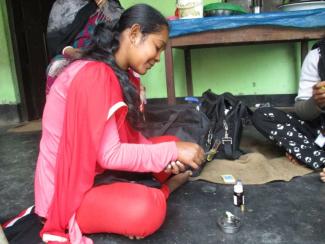Maternal health
Why paramedics and midwives matter
 dem
Pre-natal care at the village level: GK-paramedic checking a pregnant woman’s urin probe.
dem
Pre-natal care at the village level: GK-paramedic checking a pregnant woman’s urin probe.
As GK’s coordinator and chief executive officer, I am confident that we will achieve the global Sustainable Development Goal of fewer than 70 maternal deaths per 100,000 live births in the near future, well before the 2030 deadline.
Our organisation serves some 1.2 million people throughout Bangladesh. They are not a representative cross-section of the nation, of course, but our experience is relevant, nonetheless. We work in rural as well as urban areas, paying particular attention to poor and disadvantaged communities.
Basically, GK is something like the prototype of the solidarity-based national health service least developed countries like Bangladesh need (see Rezaul Hoque in D+C/E+Z e-Paper 2017/05, p. 28 / D+C/E+Z print edition 2017/05–06, p. 20). We charge patients from different social strata different rates, ensuring that all families who sign up get reliable and affordable health care. We reach out to our nation’s poorest communities.
Paramedics are the backbone of our system. We run up-to-date vocational training to ensure they are properly skilled. The plain truth is that Bangladesh simply does not have enough university-trained physicians to serve everyone. We believe that health coverage is a universal human right, so everyone must be covered (see interview with GK founder Zafrullah Chowdhury in D+C/E+Z 2012/03, p. 126). Moreover, GK has always considered reproductive health particularly important, and we have a history of promoting family planning and contraceptives. Our government has copied many of our measures.
Most of our paramedics are young women with eight to 12 years of school education. GK runs more than 40 health centres that provide services to more than 630 villages. The health centres are supported by six referral hospitals.
Every member family of GK is visited at least once per month by a paramedic. If needed, the health workers come more frequently. Among other things, they provide reproductive and health care and family-planning services:
- They register pregnant women and provide ante-natal care. For example, they measure the women’s weight, height and blood pressure. They also check for oedema, jaundice, anaemia and diabetes. They examine eyes, ears and teeth as well as foetal movements and foetal heart sounds.
- They distribute iron and calcium tablets and immunise pregnant women against tetanus. To reduce child mortality, they immunise infants against diphtheria, whooping cough, tetanus, polio, tuberculosis and measles.
- They identify high-risk mothers and refer them to medical professionals. They get special attention. If needed, babies are delivered by Caesarean section in the referral hospitals.
- The paramedics advise families on healthy and balanced diets.
- They discuss the possible causes of maternal death as well as preventive measures with families and the local community.
- They file detailed reports of all cases to the head office, so GK has compiled extensive and long-term statistics over the decades.
GK officers regularly monitor the paramedics’ work. Statistical data and field reports are checked for inconsistencies, which helps to ensure high-quality services. Antenatal and postnatal care are very important. Mothers, after all, have a vital role to play in their families and in society in general.
GK cooperates with traditional birth attendants (TBAs), ensuring that the women’s skills are up to date. It is essential that every birth is attended by a competent person and that high-risk deliveries take place in hospitals. On the other hand, it is plainly unaffordable to deliver all babies in hospitals in a least developed country like Bangladesh. Well trained paramedics and midwives are up to the task.
We believe in community-based action and involve local people in health matters. Every infant and maternal death is discussed in the community to draw lessons. The idea is to improve health services as well as household and community action. More generally speaking, health education in villages matters very much.
In recent decades, Bangladesh has made good, but insufficient progress on reducing maternal mortality. The country cut the number of deaths per live births by almost two thirds from 1990 to 2015, but the Millennium Development Goal (MDG) was to reduce it by 75 %. According to government data, the figure for 2015 was 181 maternal deaths per 100,000 births. The MDG mark was 143 per 100,000. Among the GK clientele, the ratio was 141 per 100,000 (to be precise: we recorded 18 deaths per 12,731 live births).
Bangladesh also missed the sub-target of having 50 % of births attended by skilled staff in 2015. The share rose from five percent in 1990 to 40 % in 2015. Once more, this progress was good – but not good enough, and not as good as the services we provide. Our member families are taken care of systematically, after all. In any case, the trends show that the MDGs were within reach and should be achieved soon. The SDG on maternal mortality is more ambitious of course. In our experience, it is achievable, nonetheless. GK will certainly achieve, and hopefully our country will too.
Manzur Kadir Ahmed is a the coordinator and chief executive officer of Gonoshasthaya Kendra (GK). He is a medical doctor.
gkhealth.org@gmail.com
http://www.gonoshasthayakendra.com/

